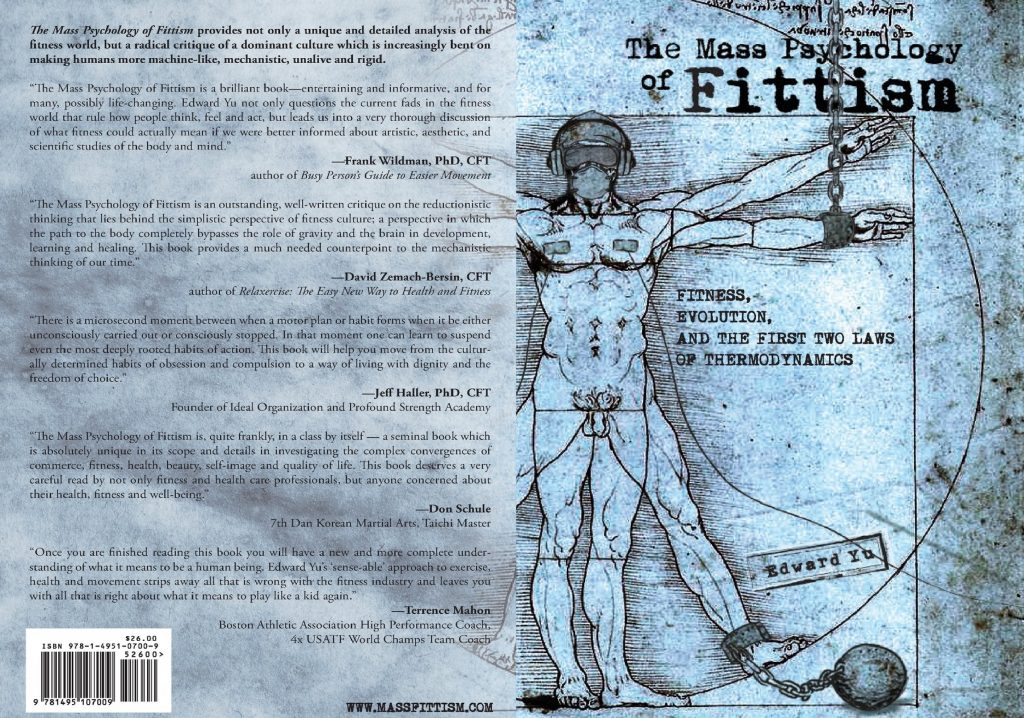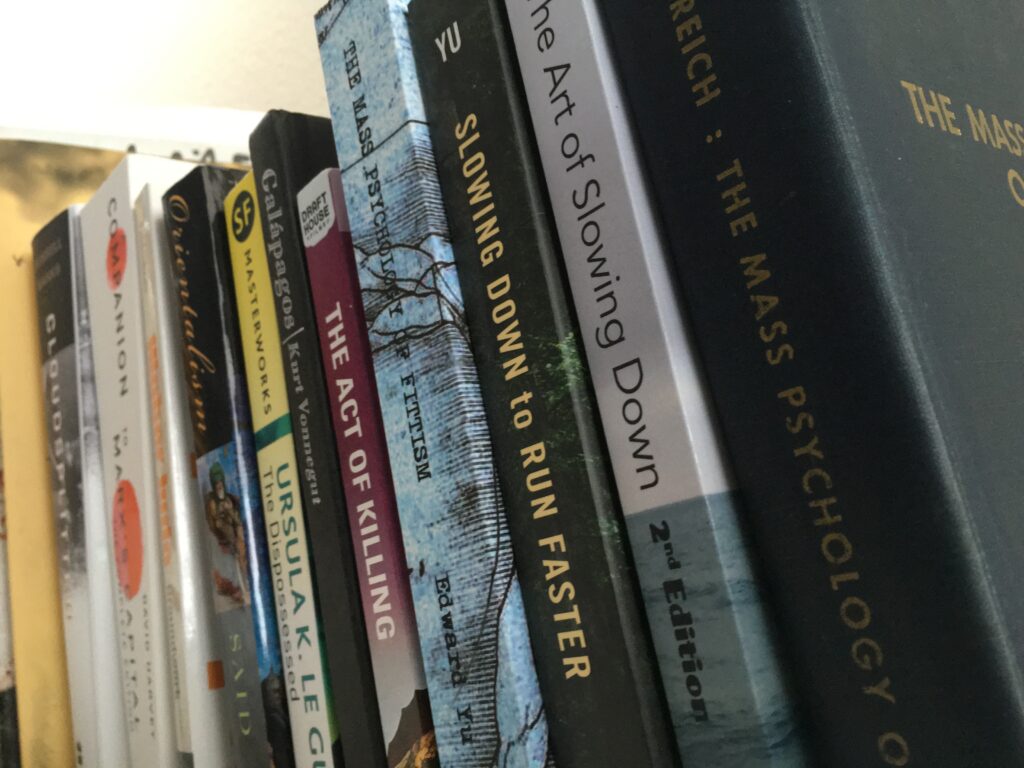(The Mass Psychology of Fittism is available at Stories Bookstore in LA, Feldenkrais Resources, Amazon, and your friendly local independent bookstore.)

Reviews for THE MASS PSYCHOLOGY OF FITTISM: fitness, evolution and the first two laws of thermodynamics (Undocumented Worker Press, 2015)
An outstanding, well-written critique on the reductionistic thinking that lies behind the simplistic perspective of fitness culture; a perspective in which the path to the body completely bypasses the role of gravity and the brain in development, learning and healing. This book provides a much needed counterpoint to the mechanistic thinking of our time.
—David Zemach-Bersin, CFT
author of Relaxercise: The Easy New Way to Health and Fitness
Co-Founder of Feldenkrais Institute of New York
The Mass Psychology of Fittism is, quite frankly, in a class by itself — a seminal book which is absolutely unique in its scope and details in investigating the complex convergences of commerce, fitness, health, beauty, self-image and quality of life. This book deserves a very careful read by not only fitness and health care professionals, but anyone concerned about their health, fitness and well-being.
—Donald K. Schule
7th Dan Korean Martial Arts
Professor Emeritus of Visual Arts, Penn State University
There is a microsecond moment between when a motor plan or habit forms when it be either unconsciously carried out or consciously stopped. In that moment one can learn to suspend even the most deeply rooted habits of action. This book will help you move from the culturally determined habits of obsession and compulsion to a way of living with dignity and the freedom of choice.
—Jeff Haller, CFT
Founder of Ideal Organization and Profound Strength Academy
Edward Yu provides a furious challenge to the fitness industry in this well-researched and provocative piece. This book is the “bible” for anyone deeply interested in an unconventional and humane approach to movement.
—Jacob Marinko
Founder of Movelution/MovNat Scandinavia
A brilliant book—entertaining and informative, and for many, possibly life-changing. Edward Yu not only questions the current fads in the fitness world that rule how people think, feel and act, but leads us into a very thorough discussion of what fitness could actually mean if we were better informed about artistic, aesthetic, and scientific studies of the body and mind.
-Frank Wildman, PhD
author of Busy Person’s Guide to Easier Movement
Once you are finished reading this book you will have a new and more complete understanding of what it means to be a human being. Edward Yu’s ‘sense-able’ approach to exercise, health and movement strips away all that is wrong with the fitness industry and leaves you with all that is right about what it means to play like a kid again.
—Terrence Mahon
Boston Athletic Association High Performance Coach
4x USATF World Champs Team Coach

Prologue to The Mass Psychology of Fittism
What Does it Mean to be Fit?
For years I’ve been uncomfortable associating the human body with fitness. Maybe because the marketed image of what a fit person is supposed to look like has little to do with Charles Darwin’s original conception of the word. Maybe because like other marketed images, the ones propagated by the fitness industry so rarely materialize in real life. Maybe because nature kills off those who are “weak” and “unfit” and in doing so, separates the chaff from the wheat, so to speak. Meanwhile, the strong and fit prosper just like on those wildlife shows where indomitable predator devours old, sick, or newborn prey. At least that’s how the popularized version of Darwin’s theory of evolution goes.
A famous failed Austrian artist took the popular idea and ran with it. He almost made it to Stalingrad. He killed some people along the way.
Fit for What?
Extreme Boot Camp?’s mission is to bring a unique style of physical fitness workouts to civilians of all levels by providing an exciting military fitness boot camp atmosphere with discipline and structure.
-from the homepage of EXTREME BOOT CAMP®
Torture becomes systematic in the hands of a different sort of person—one who is determined to use the powers of reason, and who believes in the rightness of his cause.
-CULLEN MURPHY, God’s Jury: The Inquisition and the Making of the Modern World
When we talk about fitness, a question that we often forget to ask is: “Fit for what?” If I am considered fit enough to be on a magazine cover, does that also make me fit for the rest of life, which occurs outside of the confines of 8 1/2 x 11 inches? Should Albert Einstein, who probably never performed a single push-up, be deemed unfit?
Thankfully today as compared to a mere century ago, we are much more lenient about who gets to be on top of the human food chain. For example, even though the “fittest” are often considered to be the most “talented,” “gifted,” or otherwise innately superior, these days the category may also include anyone who works hard enough, possesses the right attitude, meditates sufficiently on abundance, or burns off enough karma to climb another rung on the ladder. Thus, with the right attitude and work ethic (from this lifetime or ones previous), anyone can lose 100 pounds and get six-pack abs. Anyone can go from rags—or what was once known as a middle class stature—to riches à la Sam Walton, Bill Gates or Will Smith’s character in the Hollywood blockbuster, The Pursuit of Happyness. Anyone can attract abundance and love.
Of course, this means that the growing masses of people who are today un/underemployed, homeless, or otherwise barely scraping by must either lack the talent, fortitude, or proper amount of positive thinking to succeed. The growing masses of people who are also individually growing in mass, must be too lazy to get fit. Given this, the masses, who incidentally comprise the world’s majority, may want to spend more time in the self-improvement section of the bookstore (re)learning the “10 steps to financial success,” “9 steps to six-pack abs” or the secret laws of attracting anything from financial wealth to the perfect mate. And if any of these extracurricular efforts don’t happen to work, it may be time for military intervention—in the figurative sense, of course.
Oddly, the fact that the fitness industry has co-opted police and military terminology, methodology and discipline doesn’t seem to alarm the public. On the contrary, military-style interventions into our private lives appear to be gaining in popularity as exemplified by the growing number of fitness “boot camps” and the soaring ratings of TV shows like “The Biggest Loser.”
I always felt it obvious that people tend to get in shape when encouraged (i.e. yelled at and otherwise berated) to exercise. Yet I wonder if we are sidestepping a more fundamental issue when we find ourselves out of shape and striving desperately to be fit—sometimes to the point of hiring someone to order us around like a drill sergeant. I wonder, specifically, if the conventional notion of fitness is part and parcel of a culture that inadvertently works on a pyramid scheme in which only a small fraction can ever rise to the top—whether in health, fitness or any other category we deem desirable.
What Does it Mean to Succeed?
In another brilliantly conceived segment, Tony devotes part of the seminar to explaining the financial and emotional benefits of surrounding oneself with the right “peer group”—after which a staffer begins a sales pitch for the $45,000 Platinum program. Those who purchase one of the twelve spots will join the “ultimate peer group,” we are told—the “cream of the crop,” the “elite of the elite of the elite.”
-SUSAN CAIN, Quiet: The Power of Introverts in a World That Can’t Stop Talking
The fact that the great white shark has risen to the summit of the ocean food chain doesn’t mean that in a different environment it would remain there. Great whites thrive in particular environs, which is why you won’t see any of them in Lake Michigan, a Nebraska cornfield, or busy intersection in Tokyo. Our dominant culture similarly creates fertile conditions for the fittest, or so-called, “cream of the cream” to rise to the top. Cultural icons, such as John D. Rockefeller, Donald Trump, and Anthony Robbins, show us what we too could be if we only had the right attitude. Genghis Khan would’ve been just another Mongolian nomad had he not understood the power of public persuasion (not to mention mass murder).
Could it be that some form of social Darwinism has crept into the workings of the fitness industry in particular and our dominant culture in general—even if thickly veiled as “spiritual growth,” “financial wizardry,” or “self-help”? Could it be that something about our dominant culture tends to push us lower on the food chain so to speak, and makes it nigh impossible to be other than out of shape, and thus, unfit? If so, then being unfit need not be judged any more harshly than being in debt, or for that matter, average—especially when considering that the average person in today’s modern industrialized world is either out of shape, overweight, and in debt, or on her way to being out of shape, overweight and in debt.
